
Forty-one portraits of young women who died in a horrific fire at a state-run children’s home in San José Pinula, Guatemala, lined the walls of the University of New Brunswick’s Renaissance College from March 15 to 22. Now they’re hanging on the walls of the off-campus lounge at St. Thomas University.
The travelling exhibit is titled Justice for the 56 Girls of Hogar Seguro, Guatemala. It aims to honour 41 of the 56 girls ranging in age from 14 to 17 who died on International Women’s Day, March 8, 2017 and bring to light the oppression they faced.
The exhibit opened March 25 at STU.
Tracy Glynn, a STU professor and volunteer at Maritimes-Guatemala Breaking the Silence Network (BTS), helped organize the event in Fredericton.
“It’s something that we shouldn’t forget, that these girls’ lives mattered and their stories mattered,” said Glynn.
The art project was originally launched May 15, 2017 by a media organization in Mexico, along with 60 other media agencies and 40 other organizations and collectives from around the world.

The 41 portraits were created by 58 different artists from Mexico, Argentina, France, Italy, Spain and Guatemala.
Glynn thinks the portraits of the young woman are moving and powerful.
“I think [the artists] tried to capture the spirit of the girls … the artists talked to the family members and looked at photographs of them,” she said.
Glynn said the home where the 41 children died was supposed to be safe. She said some parents sent their children there who were in danger of being trafficked, or for other reasons like poverty.
But the safe home was anything but safe.
The children were raped, abused, weren’t given enough food and lived in overcrowded spaces. There were about 800 children living in a home meant for 500.
The day before the fire, young women in the home protested their living conditions. As a result, police locked 56 girls in a small classroom and left them overnight without blankets or access to facilities.
Around 9 a.m., a fire started. The police, who guarded the door all night, didn’t allow the girls to escape and left the door to the classroom locked. Nineteen died on scene and the remaining 22 died in hospital.
As of yet, no one has been convicted of the crime.

Rachel Bensler, a first-year student at Renaissance College who was involved in bringing the exhibit to campus, said the girls who were locked in the classroom were told by police they would be in there for a month. Bensler said even though it probably wasn’t a true statement, it was a successful fear tactic to use on the young girls.
“Those girls were not in peace when the fire started and they were most certainly not in peace when the fire ended,” said Bensler.
Nine other organizations were involved in organizing the exhibit, including the St. Thomas University Human Rights Society and STU International Students’ Association.
Second-year STU student Anna Sirois became involved with the exhibit through her Inequality in Society class. One of their assignments was to partner with a non-profit organization. Sirois and three of her classmates partnered with No One is Illegal-Fredericton, one of the organizations involved with the exhibit, and helped set it up at Renaissance College and STU.
“We do have a significant international community at STU, and we do have communities in Fredericton … who feel emotionally connected to a lot of these events that occur,” said Sirois.
“I think it’s important because it’s not just art, it tells a story. It’s not the aspect of the artistic piece being hung up that’s the focus. It’s the story. That’s the focus, it’s the idea that we’re putting a name to a face and recognizing the oppression that they faced.”
Glynn said what’s happening in Guatemala is happening in other parts of the world as well.
“One of the areas of work that Breaking the Silence works on is femicide, looking at the impunity around the murders of women and girls in Guatemala, and also making the connections here in Canada with missing and murdered Indigenous women and girls,” said Glynn.
BTS made postcards for people to send to Minister of Foreign Affairs Chrystia Freeland to call on the Canadian government to intervene.
“Especially [because] the Trudeau government has this feminist international policy now,” said Glynn, referring to Canada’s first Feminist International Assistance Policy that’s meant to focus on gender equality and the empowerment of women and girls around the world.
“Canada intervenes in different ways in Guatemala, but they could be pressuring Guatemala to act in a way to further justice for these girls.”
The exhibit will be on the walls of the off-campus lounge until March 28.
Sirois thinks the exhibit sends an important message.
“I think especially at STU, we’re always talking about social justice, so this is another way on how we can promote social justice.”
